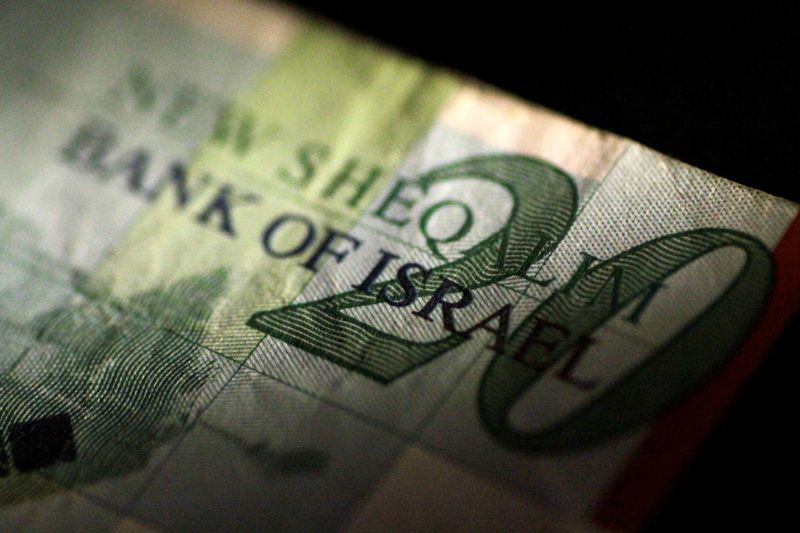By Steven Scheer
JERUSALEM (Reuters) - The Bank of Israel will need to be aggressive to contain the shekel's rise and push inflation higher through another round of foreign-currency purchases.
The shekel has gained more than 7% this year against the dollar, making it one of the world's strongest currencies, and 9% versus a basket of currencies of main trading partners, helping to push inflation to near zero but hurting exports.
Analysts doubt the trend will change. Israel's economy is growing around 3% a year, the country maintains a current account surplus, foreign investment flows are robust and another large natural gas site is set to begin production.
Economists expect dollar-shekel to hold between 3.4 and 3.5 per dollar in 2020, as long as the central bank remains aggressive. It stood at 3.465 per dollar on Tuesday, unchanged from two weeks ago and mainly helped by the bank buying $1.3 billion of foreign currency the last week of November and unknown amounts this month.
Andrew Abir, head of the Bank of Israel's market operations department, told Reuters last week that interest rate reductions remain on the table, but intervention in the foreign exchange market is currently the best way to lift inflation and boost Israel's economy
Israel's benchmark rate remains at 0.25%. The central bank is reluctant to lower it to 0.1%, zero or even negative rates and hopes buying large amounts of dollars works.
"Are they going to change the long-term fundamental trend of the shekel? No. But are they going to be able to put speculators out of the market? Maybe. That's pretty much they way they look at it," said Neil Corney, country manager of Citi Israel.
So far, its intervention policy, which began moments after the central bank held its key rate, defying market expectations, has largely held.
BOUGHT $94 BILLION SINCE 2008
But for it to continue to work, the Bank of Israel will need to keep spending, since for most of 2018 and 2019, policymakers let the shekel appreciate. Only when inflation fell to 0.3% by September from 1.5% in May, did the bank -- which seeks to get inflation within an annual target of 1% to 3% -- decide to act.
"The turnaround in inflation in the summer was a very explicit signal to them," said Mai Doan, an economist at Bank of America (NYSE:BAC). "They have a dual mandate of inflation and growth, and at this stage there is a risk to both mandates, and so they are under pressure to act ... If you look at the past experience it (intervention) has to be something quite bold."
The Bank of Israel has bought some $94 billion of foreign currency since it began intervening in March 2008 to prevent a rapid shekel appreciation, bringing its forex reserves to more than $122 billion. Since 2006, the currency basket has appreciated more than 50%.
Analysts say that since intervention is a short-term tool, it cannot work over time.
"If they don't do smart intervention ... the speculators are going to eat the Bank of Israel up," Bank Leumi Chief Economist Gil Bufman said.
"They are going to have to constantly surprise the market with days of large sums of intervention and then nointervention at all and being in the market at all hours of the day, because a lot of speculation happens when market liquidity is thin."
Bufman doubted intervention will fail to push up inflation, because the excess cash remains in the banking system. "It's not generating an increase in cash in the hands of the public and it's not generating a surge in consumption that will raise prices," he said.
